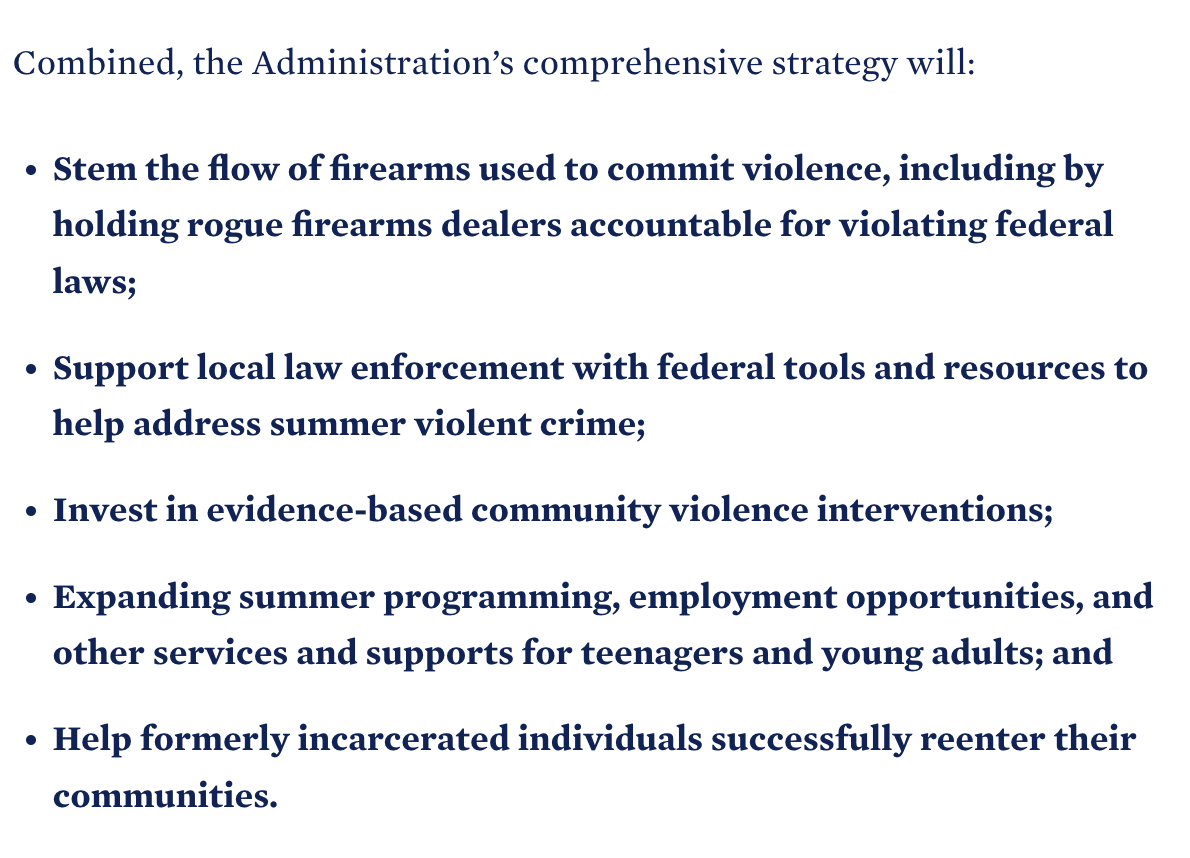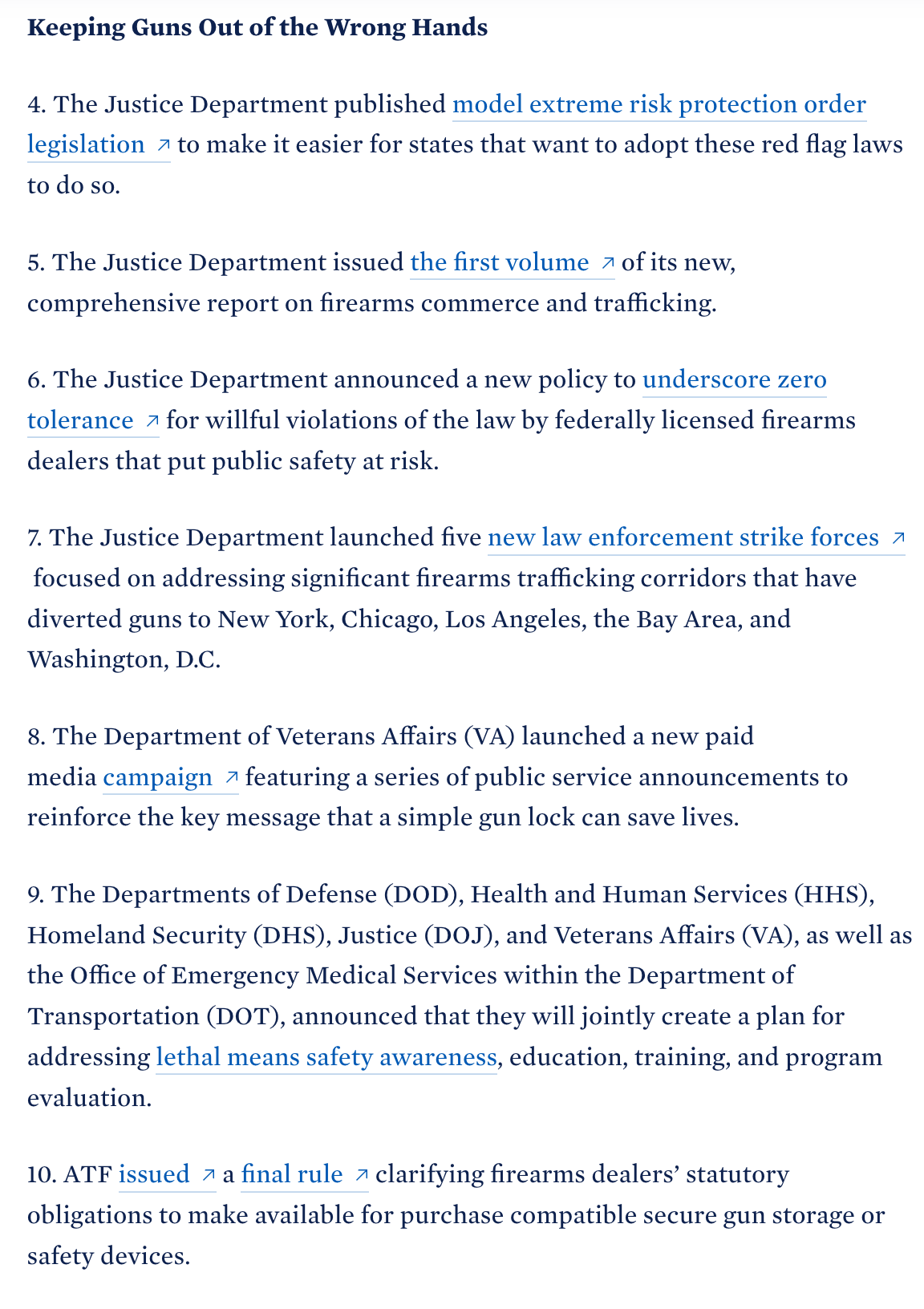Montana Attorney General Austin Knudsen believes the Biden administration has launched multiple rulemaking and data collection campaigns targeting gun owners in the United States with "unprecedented specificity" that allegedly violate their constitutional rights. Beginning in July of 2022, Knudsen has doggedly pursued several alleged infringements, including tracking privately made firearms, the collection of data from gun owners who use credit cards to purchase guns, and the alleged use of FedEx and UPS to track and report firearm sales. Knudsen seems concerned that the Biden administration and its DOJ are targeting gun owners and sharing the data collected from various sources with the federal government.
Biden Administration Timeline on Gun Regulation
Beginning in April 2021, President Biden and Attorney General Garland "directed the Bureau of Alcohol, Tobacco, Firearms, and Explosives (ATF) to issue a comprehensive report on firearms commerce and trafficking." According to an ATF press release, volume 1 of the "Firearms in Commerce" report was publicly issued on May 17, 2022. The purpose of the report was to document firearms commerce in the United States and to use that data to help reduce crime.
In early June of 2021, the Justice Department "announced two new steps to help address the continuing epidemic of gun violence." The DOJ issued a notice of proposed rulemaking "that would make clear that the statutory restrictions on short-barreled rifles apply to pistols that are equipped with certain stabilizing braces and intended to be fired from the shoulder." The DOJ also "published model legislation and detailed commentary that will make it easier for states to craft "extreme risk protection orders" authorizing courts to temporarily bar people in crisis from accessing firearms," known more commonly as "Red Flag Laws."
Subsequently, on June 23, 2021, President Biden and Vice President Harris announced their "comprehensive strategy to combat gun violence and other violent crime" using "the Rescue Plan's historic funding levels" to, among other things, "stem the flow of firearms" in the U.S. They claimed that the pandemic contributed "to the proliferation of illegal guns" causing an increase in violence. At the time, Biden stated, "we are experiencing an epidemic of gun violence in this country." The "comprehensive strategy" is summarized in the screencap below:
 Biden/Harris Comprehensive Gun Violence Press Release/June 2021
Biden/Harris Comprehensive Gun Violence Press Release/June 2021
On July 11, 2022, President Biden followed with a specific Executive Order delineating "21 executive actions to reduce gun violence" in the United States. The order asked the DOJ to issue rules and direct legislation to rein in the "proliferation of ghost guns, to increase their resources "dedicated to violent crime," and regulate various types of "devices" used with firearms. He also laid out a 7-point plan to "keep guns out of the wrong hands." The 7 points laid out a more specific and robust plan to regulate firearms. Red flag laws, the commerce and trafficking of guns, zero-tolerance policies, strike forces targeting trafficking corridors, and ATF rules are addressed in these 7 points.
 Biden EO/https://www.whitehouse.gov/briefing-room/statements-releases/2022/07/11/fact-sheet-the-biden-administrations-21-executive-actions-to-reduce-gun-violence/July 11, 2022
Biden EO/https://www.whitehouse.gov/briefing-room/statements-releases/2022/07/11/fact-sheet-the-biden-administrations-21-executive-actions-to-reduce-gun-violence/July 11, 2022
Knudsen's Coalitions, Letters, and Lawsuits
Knudsen issued his first response to Biden's gun regulations in August of 2021 when he participated with numerous other states in an August 21, 2021 letter commenting on ATF rulemaking on the "Frame and Receiver Rule." On April 11, 2022, he returned with a press release opposing the banning of "ghost guns," referencing the August 2021 letter.
On July 27, 2022, Knudsen followed Biden's July 11 EO by forming a coalition of attorneys general from 16 other states. This press release was responsive to the above-referenced rulemaking on the private assembly of firearms that resulted from Volume 1 of the ATF report. The resulting "rulemaking would regulate unfinished, non-functional firearm parts as if they were complete firearms," according to Knudsen's press release. The "Frame and Receiver Rule" went into effect on August 24, 2022. Knudsen contends it allegedly violates the right to assemble firearms. He also maintains it "regulates unfinished, non-functional firearm parts as if they were complete firearms." Knudsen clarifies in the press release:
"This rule infringes on every American's right to assemble firearms for their own use— a long-held tradition dating back to the founding of our nation. Criminals will ignore this rule, and it will not make Montanans safer. It will, however, shut down firearm companies, allow the government to end online sales of parts, and expand federal access to gun owner data—all without congressional approval."
In the same press July 27 release, Knudsen took issue with rulemaking which would take "steps toward the creation of an illegal national firearms registry, which would require firearms retailers to keep all sales records beyond their current 20-year retention requirement and eventually turn them over to the ATF instead of destroying them, which would compromise the privacy of every gun owner in America." On the same day, a coalition of 17 attorneys general "joined Morehouse Enterprises, Gun Owners of America, and Gun Owners Foundation in filing [a] complaint against the ATF, the U.S. Department of Justice, and ATF Director Steve Dettelbach."
September 20 Coalition Addressing Credit Card Companies
In September 2022, Knudsen followed with another coalition of 24 other states to alert "the Chief Executive Officers of three major credit card companies that the recent creation of a Merchant Category Code for the processing of firearms purchases from gun stores is potentially a violation of consumer protection and antitrust laws." Tennessee agreed to co-lead the charge with Montana.
Knudsen and Attorney General & Reporter Jonathan Skrmetti contend that the monitoring and tracking of firearm purchases "creates a list of gun buyers," which could mean that law-abiding citizens exercising their Second Amendment Rights might be unfairly and illegally targeted through the illegal collection of personal data. The coalition of attorneys general wrote:
"Press releases from public officials make clear that the new merchant code was created and adopted in concert with various state actors, which may additionally create the potential for both civil and criminal liability for conspiracy to deprive Americans of their civil rights.
Social policy should be debated and determined within our political institutions. Americans are tired of seeing corporate leverage used to advance political goals that cannot muster basic democratic support. The Second Amendment is a fundamental right, but it's also a fundamental American value. Our financial institutions should stop lending their market power to those who wish to attack that value."
Identical letters went out on September 20th from Skirmetti, Knudsen, and the other 22 states addressing the CEOs of the three major credit card companies, American Express, Mastercard, and Visa. The letter challenged the "legality of the recent actions" the credit card companies took at the "behest of the International Organization for Standardization." The letter also referenced the belief that such collection of data allegedly uses "corporate leverage to advance political goals" and "social policies" that have not been adequately debated "within our political institutions."
November 29 Announcement Addressing FedEx and UPS
Knudsen's third response came on Tuesday. In his November 29 press release, he announced his request to solicit a response from two major shipping companies, UPS and FedEx. He alleges they have instituted a requirement to ship "separately and track firearms, firearms parts, and firearm products so gun purchases can be tracked and retain documents about what specific items those shipments contain and make that information available to the companies upon request." The press release states in part the possible violation of warrant requirements:
"These demands, in tandem, allow [UPS/FedEx] to create a database of American gun purchasers and determine exactly what items they purchase. In doing so you, perhaps inadvertently, give federal agencies a workaround to normal warrant requirements. This allows [UPS/FedEx] to provide information at will or upon request to federal agencies—information detailing which Americans are buying what guns. Additionally, we recommend that you consider taking actions to limit potential liability moving forward, including the immediate cessation of any existing warrantless information sharing with federal agencies about gun shipments."
Knudsen and the other 17 states followed with an identical letter to each of the two shipping companies. In the letter, Knudsen explains that the shipping companies now require gun owners to "create three separate shipping accounts: one for firearms, one for firearm parts, and one for all other firearm-related products. Under this three-tier system, gun sellers cannot mix and match shipments, which reveals to your company whether they are shipping a gun, gun part, or a gun-related item." The most pressing concern expressed, however was the idea that these policies would allow the shipping companies to "comply with requests from applicable law enforcement or other governmental authorities" even when those requests are "inconsistent or contrary to any applicable law, rule, regulation, or order."
Knudsen believes such requirements could give federal agencies a "workaround to federal law." The law pertaining to the retention and destruction of records prevents federal agencies from using gun sales to create gun registries. Knudsen's letter asks the shipping companies to clarify a number of policies and explain why the changes were made, whether they worked together to institute the changes, and whether any federal agency employees "helped draft the updated shipping agreements."


